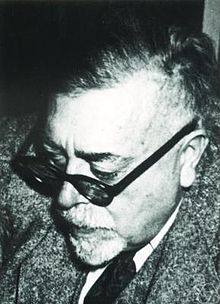Norbert Wiener
(Back to index)
Norbert Wiener (November 26, 1894 – March 16, 1964) was an American scientist, mathematician, and philosopher. He served as a professor at the Massachusetts Institute of Technology (MIT). He is considered by some to be the father of cybernetics [1]. The results of his work in mathematics, cybernetics, communication theory, computer design, information theory and philosophy are considered to be a foundation for both the modern information age and information and computer ethics [2].
Contents
Early Years and Education
Wiener was born on November 26, 1894 in Columbia, Missouri to Leo and Bertha Wiener. His father was a professor of Slavic languages at Harvard University and oversaw Norbert’s early education. Norbert did not receive formal schooling until he attended High School at age 9 in Ayers Massachusetts. He graduated at age 11. Wiener acquired his first collegiate degree at Tufts University in 1909 (at the tender age of 14). His major was mathematics. He then moved on to a pursuit of zoological graduate studies at Harvard University. However, poor vision and coordination forced him to switch to a PhD in mathematical logic, which he attained in 1912[3]
Contributions to Information Theory
Wiener made several key contributions to information theory and in turn provided a philosophical and scientific grounding for information and computer ethics [4]. He made many speculations and assumptions about the nature of information in our universe, many of which are in play today. His key ideas included:
- Objects and processes in our Universe consist of matter, energy and information
- All animals are information-processing entities with behavior that is dependent upon such processing.
- Humans have especially sophisticated information processing units in their central nervous system that distinguish them from other animals.
- Information is physical and is subject to the laws of nature and science. Along with matter and energy it is a fundamental building block of the universe.
(All from [5])
Contributions to Information and Computer ethics
Wiener is considered to be a key player in the development of cybernetics, particularly with regard to the social implications of new technology [6]
He recognized that new computing technology would have the potential for good and evil stating, “Long before Nagasaki and the public awareness of the atomic bomb, it had occurred to me that we were here in the presence of another social potentiality of unheard-of importance for good and for evil.” [7] While worrying about potential technological harms such as unemployment caused by robots and computers making ethically disastrous decisions on behalf of humans his view of cybernetic machines was often optimistic rather than negative [8]Another significant contribution Wiener made to information ethics was the introduction of the concept of entropy. Wiener considered the fundamental natural evil to be entropy, “the loss of useful Shannon information and useful energy that occurs in virtually every physical change,” [9]The concept of entropy is crucial in the work of information ethicist Luciano Floridi [10].
Wiener is credited as being the founder of information and computer ethics, although he did not use either term. He wrote two books, The Human Use of Human Beings (1950), and God and Golem Inc. (1963) that touched upon topics relevant in today’s information and computer ethics. These included the effects of computers upon security and unemployment, the responsibilities of computer professionals, computers impact of persons with disabilities, artificial intelligence, robot ethics, humans with machine augmented body parts and information networks with regard to globalization. [11]
References
- ↑ http://books.google.com/books/about/Dark_Hero_of_the_Information_Age.html?id=LpUtqB2jWlEC
- ↑ Bynum, Terrell. Chapter 2 of The Cambridge Handbook of Information and Computer Ethics (edited by Luciano Floridi). Cambridge University Press, 2010. p. 24.
- ↑ http://www.tufts.edu/as/math/wiener.html
- ↑ Bynum, Terrell. Chapter 2 of The Cambridge Handbook of Information and Computer Ethics (edited by Luciano Floridi). Cambridge University Press, 2010. p. 24.
- ↑ Bynum, Terrell. Chapter 2 of The Cambridge Handbook of Information and Computer Ethics (edited by Luciano Floridi). Cambridge University Press, 2010. p. 24.
- ↑ http://en.wikipedia.org/wiki/Cybernetics#The_roots_of_cybernetic_theory
- ↑ http://southernct.edu/organizations/rccs/?p=2444
- ↑ Bynum, Terrell. Chapter 2 of The Cambridge Handbook of Information and Computer Ethics (edited by Luciano Floridi). Cambridge University Press, 2010. p. 29-30.
- ↑ Bynum, Terrell. Chapter 2 of The Cambridge Handbook of Information and Computer Ethics (edited by Luciano Floridi). Cambridge University Press, 2010. p. 25.
- ↑ http://www2.units.it/etica/1999_2/floridi/node8.html
- ↑ http://plato.stanford.edu/entries/ethics-computer/
